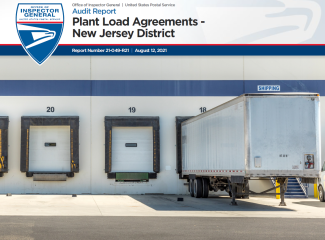Plant Load Agreements – New Jersey District
Objective
Our objective was to assess the effectiveness of plant load agreements in the New Jersey District. We selected this district based on volume and revenue declines from fiscal year (FY) 2019 to FY 2020 of 32 percent (500 million mailpieces) and 31 percent ($109.8 million in revenue), respectively. This district ranked sixth in the nation for revenue declines.
Mail volume and revenue declines in this district aligned with nationwide declines of First-Class and Marketing Mail which occurred largely as a result of the COVID-19 pandemic. Such declines could result in plant load agreements that are no longer cost beneficial to the Postal Service.
Plant load agreements are special arrangements between the U.S. Postal Service and certain commercial mailers. Mailers interested in establishing a plant load agreement must already have a Postal Service-approved detached mail unit (DMU) at their mailer facility, wherein a Postal Service clerk is on-site performing mail verification, acceptance, dispatch, and other related functions. Mail is then transported from the DMU to a Postal Service facility for acceptance and processing.
Mailers with a DMU can request a plant load agreement by providing approved amounts of mail volume and weight at a certain level of sortation. In exchange, the Postal Service provides acceptance and, for some agreements, transportation from the DMU to the Postal Service’s destination facility.
The Postal Service benefits from plant load agreements because it allows mail to bypass handling at a Postal Service location, which reduces processing time, staffing, and loading dock space requirements at Postal Service facilities.
There are three types of plant load agreements, which are differentiated by the distance the mail travels and whether the Postal Service or customer provides the transportation. These three types of agreements are known as intra-district, inter-district, and expedited. For intra- and inter-district, the Postal Service transports mail from the mailer’s facility to a Postal Service facility and for expedited, the mailer transports their own mail.
A district Plant Load Committee, established by the district manager, is responsible for reviewing each plant load application. The committee should also monitor agreement performance since conditions such as mail volume and transportation routes can change.
As of February 2021, the New Jersey District had 15 plant load agreements – six intra-district and nine expedited agreements. We reviewed all 15 agreements and conducted site visits to five of the six DMUs. The sixth did not mail frequently and did not produce mailings to observe during our site visits.
Finding
The New Jersey District did not effectively monitor, approve, or retain copies of its plant load agreements. Specifically, we found commercial mailers did not always meet plant load volume and weight requirements, the district approved agreements with incomplete information and incorrect forms, and did not retain copies of prior plant load agreements. Additionally, we noted that two DMUs did not calibrate their scales and a third was missing a scale. At a fourth facility, the Postal Service clerk calculated mailpiece counts inaccurately during our observations.
These issues occurred because the district did not provide sufficient oversight of these agreements. Specifically, the district did not establish a Plant Load Committee to oversee the approval and monitoring of these agreements as required and did not have procedures for monitoring performance or maintaining prior agreements. Furthermore, Business Mail Entry management, new to their positions, were not aware of annual scale calibration requirements and one DMU was in the process of replacing its scale. Additionally, a Postal Service clerk was not aware of all mail acceptance requirements, notably that the piece count tolerance should not exceed 1 percent.
As a result, there is reduced assurance that these agreements are financially beneficial to the Postal Service. Until the Postal Service addresses these issues, it is at risk of incurring unnecessary costs of $42,221 annually to transport mail from customer facilities with insufficient revenue and volume. In addition, we noted $52.5 million of revenue at risk for uncalibrated and missing scales.
Finally, we noted the revenue and volume for mailings produced and verified at two DMUs were incorrectly recorded under the Business Mail Entry Unit cost center. The errors coincide with the deployment of Seamless Acceptance at the two DMUs beginning April 2020. Management was aware of the issue and is working to remediate it.
Recommendations
We recommended the district manager:
- Develop procedures for monitoring mail volume, weight, and preparation performance in accordance with requirements set forth in the plant load agreements.
- Establish a Plant Load Committee to reassess each plant load agreement for compliance, including completing the appropriate authorization forms and ensuring that each agreement contains complete information.
- Develop procedures for ensuring the retention of expired plant load agreements.
- Provide an action plan to ensure scales are calibrated and available at each DMU to calculate single-piece mail weights.
- Reinforce proper piece count calculations and mail acceptance procedures at DMUs.
- Provide an action plan for DMUs with incorrect cost center mapping to ensure revenue is allocated to the proper cost centers.

